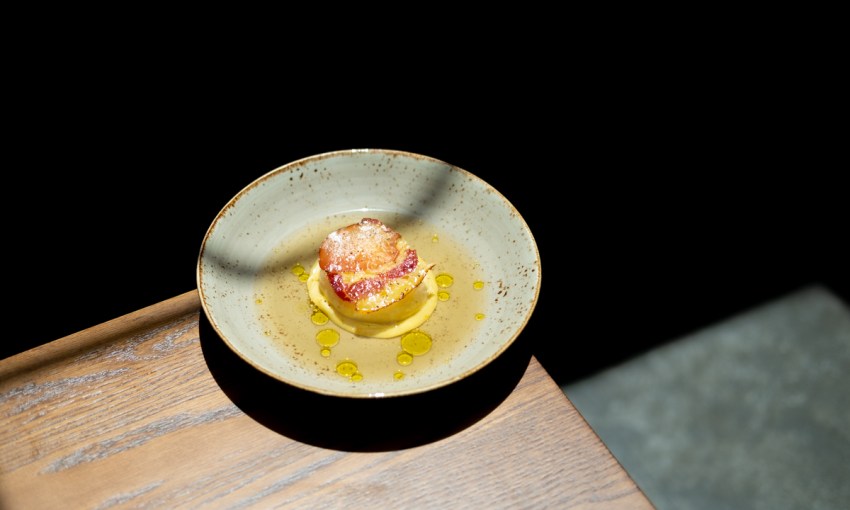Chef Andrew Wandless reckons schnitzels are a crutch too many pubs lean on.
The Brompton Hotel’s war on mediocre pub food
A golden orb plated on orange ceramic is placed carefully at CityMag’s table one afternoon at The Brompton Hotel.
There are salt flakes speckled in its jagged, deep-fried surface, and it sits atop a bed of cabbage slaw and lyonnaise potatoes.
With our right hand, we place our fork atop the orb to keep it steady, and with our left plunge a knife into its crown and pull down with a crunch, tearing into the tender chicken beneath the crust from top to bottom.
Steam plumes upward from the hollow ball; butter escapes below, trickling onto the slaw and potatoes.
The steaming dish before us is The Brompton Hotel’s chicken Kyiv, and though it may share some superficial similarities to a schnitzel – succulent chicken, a fried crumb and chips (kind of) as accompaniment – it is notably not a schnitzel.
To the chagrin of some, the pub relaunched last year without a schnitzel on the menu. Dubbed ‘Schnitzelgate’ among the pub’s staff, The Advertiser announced the Brompton’s reopening under Duxton Pubs in November thus: “Pub with no grub: Punters demand Brompton bring schnitty back”.
The kitchen team took the news in stride – all press is good press. But head chef Andrew Wandless’ reason for doing away with the schnitty is considered.
Schnitzels, in his opinion, are mid.
“The main reason why a schnitzel, in my opinion, sells the most, is you know it’s going to be alright. It’s going to be a six out of 10,” he says. “So everything else [on the menu must be] mediocre, that’s why it’s the biggest selling. If we make everything else good, then we don’t need to have a schnitzel on.”
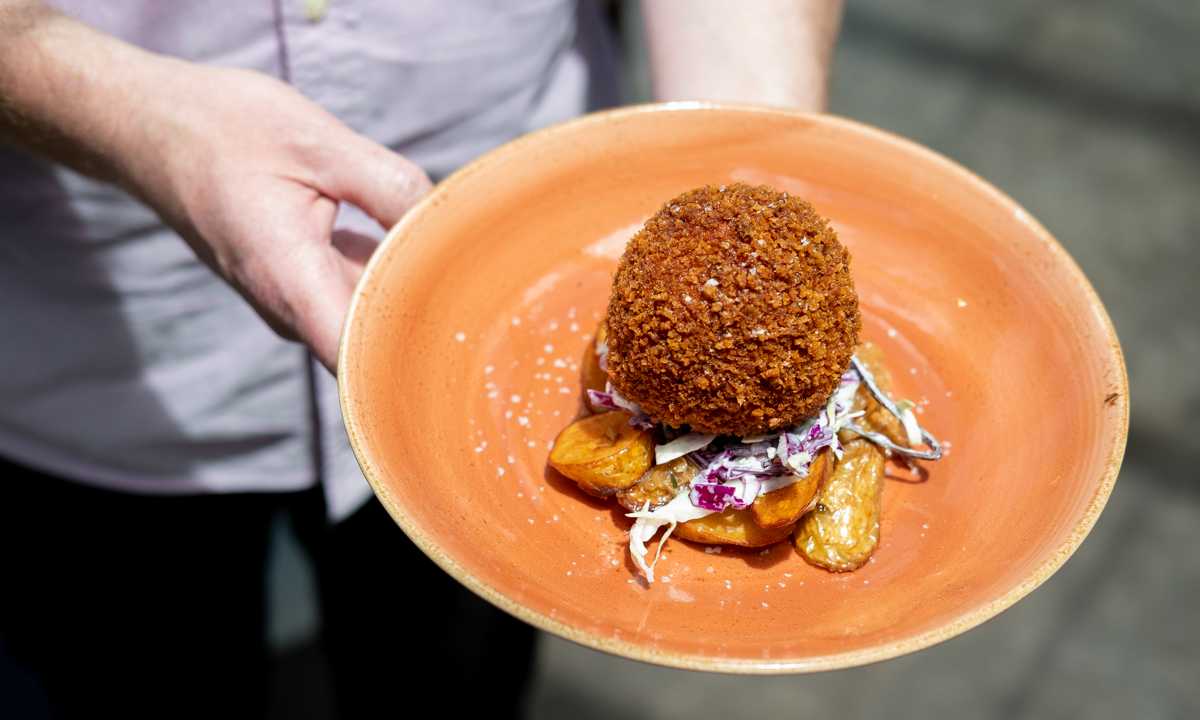
Above: Not a schnitzel
Andrew has come to The Brompton Hotel with a decade and a half of kitchen experience, starting with his apprenticeship on Sydney’s Northern Beaches.
After completing his apprenticeship six months early, he bought a one-way ticket to London, where he spent the next 10 years working at Michelin-starred restaurants – Rhodes Twenty Four, Hibiscus, The Ledbury, Fera at Claridges and Texture.
It was tough living early on; the hours were long and the pay was not good. “I got paid on a Tuesday; every Monday I would have no money. Straight up against the wall,” he says. “I had a shaved head because I had no money. I used to cut my own hair.”
This was a deliberate lifestyle choice. Andrew wanted skills, regardless of the cost. He left Australia “a cocky 21-year-old”, he says, but in his new city he “realised very quickly that I didn’t know how to cook as well as I thought I did, and I got drilled”.
“I worked for some violent chefs, some hard chefs, and I learnt the hard way – with a stick not a carrot – and yeah, that’s what I needed as a young guy,” he says. “Not that it saved me, I had a great childhood, I didn’t have a bad childhood, but I really wanted to learn and I wanted to be as best as I could be.”
After his decade in London, Andrew returned to Australia, landing in Adelaide, where his family had relocated to during his expedition. He worked at Magill Estate for seven months, but then moved back to Sydney to work for the Merivale group, opening Una Más in Coogee in December 2019.
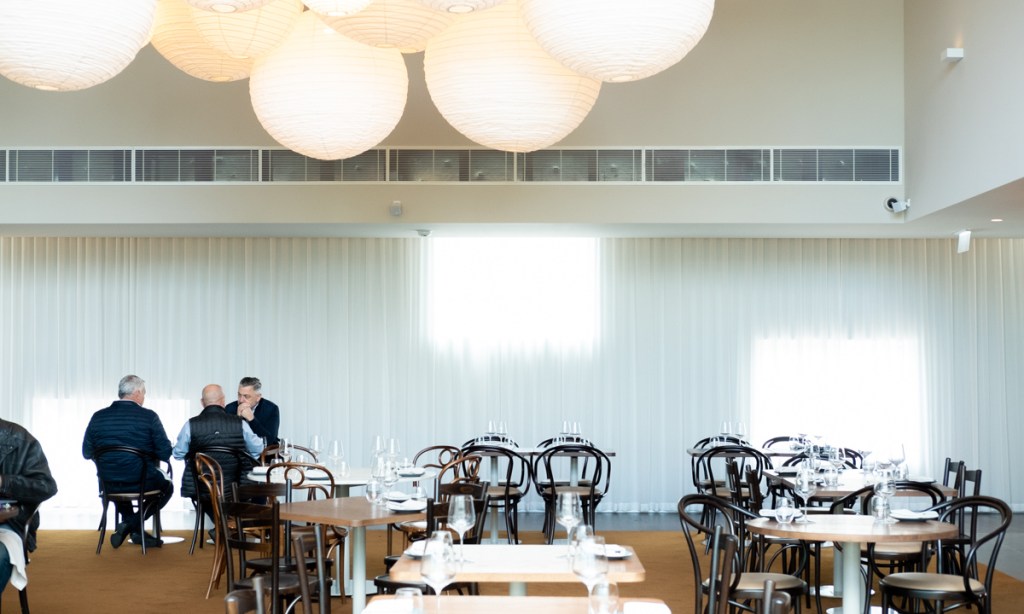
The Brompton Hotel dining room
The Brompton’s reinvigoration dates back to September 2021, when it was acquired from the Basheer Hotel Group by Duxton Pubs. The new owners ran the venue until Christmas of that year, at which point they closed it for renovations. They used this time to reconsider its food and beverage offering.
The group tore out the gaming room, removing a wall so as to reinstate the bar area, where there is now casual seating, a dedicated, snackier menu, and a pool table.
Under the Basheers, the pub had a Stonegrill menu, so Josh Hillary, general manager of Duxton Pubs, knew the venue worked as a dining destination. They refit the main dining room, opened up the kitchen, and started thinking about chefs they could bring in to create a levelled-up pub concept.
Josh and the Duxton owners, Ed Peter, Brett Matthews and Martin Palmer, had heard through Jake Kellie (of Martin’s non-Duxton restaurant Arkhé), who’s friends with Andrew, that the chef was looking to return to Adelaide. In early 2022, Josh flew over to Sydney with a pitch.
“Initially… it was just ‘Let’s get together and work out what you want to do’,” Josh says. “Once we met, the first thing that came into my mind was [The Brompton].
“We kept chatting, and… conceptualising what this would look like, how it would live in both worlds – it’s important to have a restaurant offering, but also a bar offering.
“We wanted it to be something destination-led, because as connected as it is to that density of population, it’s always going to be better to give people a reason to come here, which is the dining room offering.”
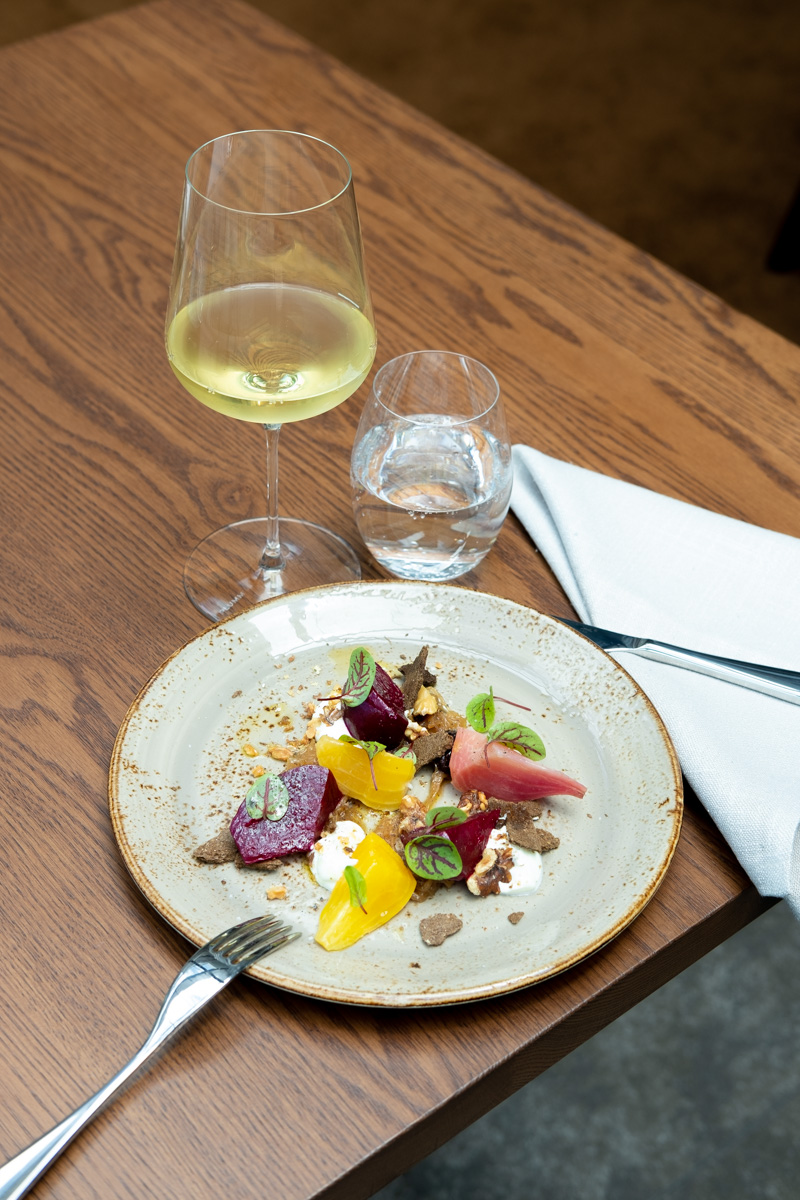
The Brompton’s heirloom beetroots, goat’s cheese and confit raisin
For Andrew, this was a chance to dig into a type of dining experience he’d developed an appreciation for in London.
“I like pubs. That’s the best thing about London, for me, was pubs,” Andrew says. “Pubs in Australia went almost supermarkety and everything had to have gaming, plastic chairs, you hear the echo. You don’t hear the feel of the wood or the bricks anymore. They just basically make it all white and put tiles down, and then a massive big screen and a TAB and that’s it. And those fucking buzzers and things like that. That’s not what a pub was.”
The Brompton, though it has a grey panel and glass box suckled to its side like so many pubs that underwent refits in the 2010s, still has plenty of its 19th century hotel heritage on show.
“It’s a beautiful building,” Andrew says. “It’s got good bones and it’s nostalgic, and that’s why I’m bringing that good pub, European kind of style.”
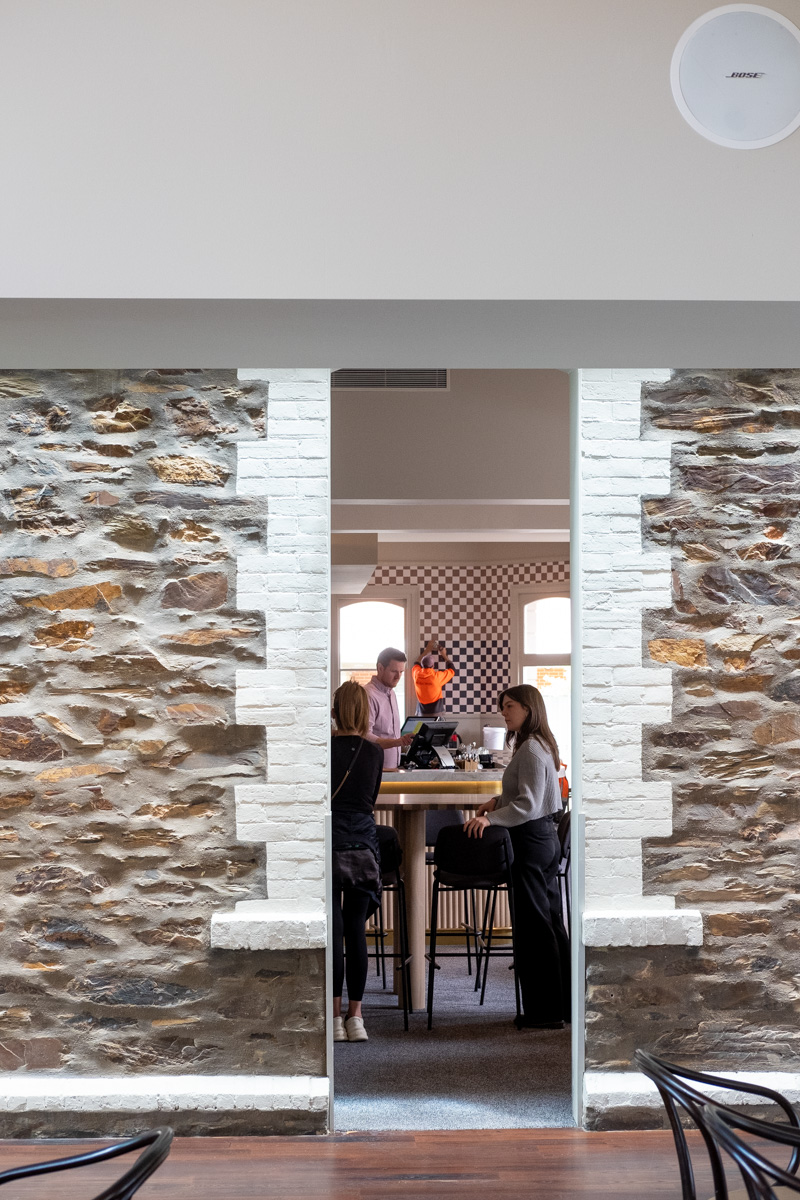
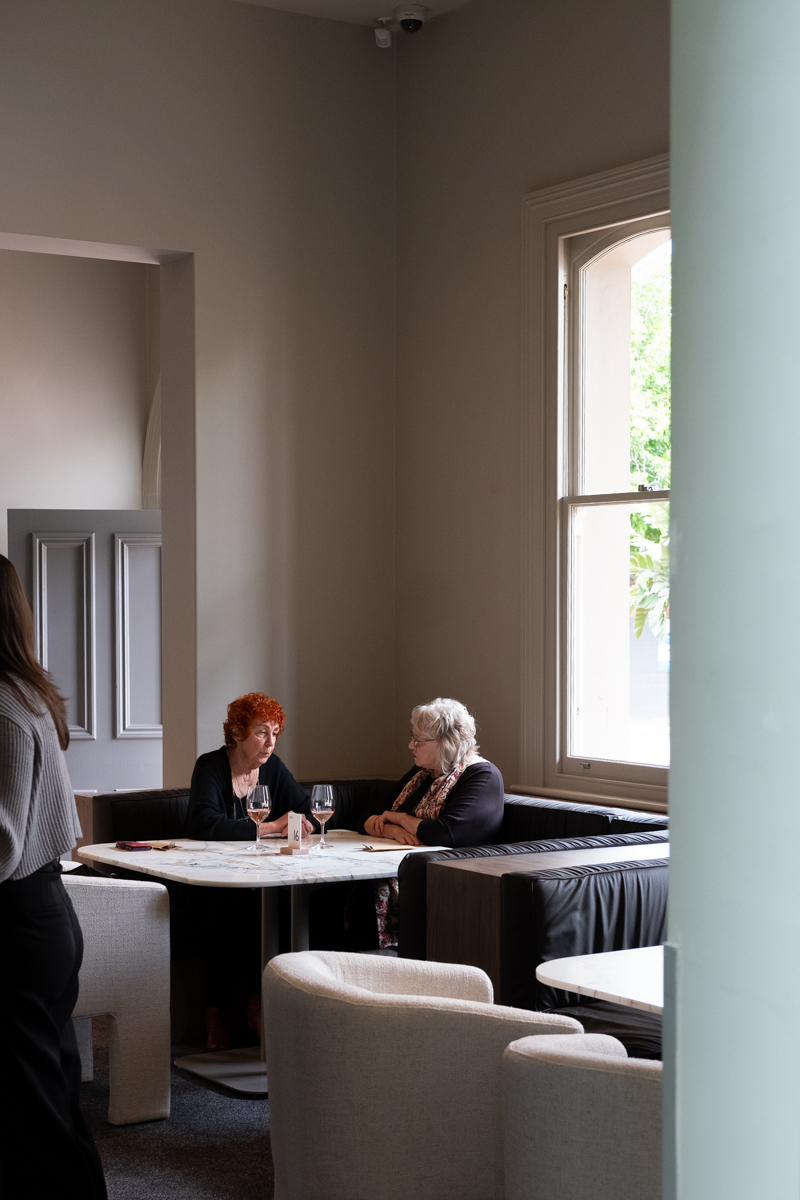
Diligence and hard work are important values to Andrew. If there is a way to make a dish better that takes a little bit more time, that’s the method he’ll choose.
“I do things not to make it hard just to make it hard, but it’s important,” he says.
“Like, the sweet potato ravioli – yeah, it’s hard to make, but it tastes nicer, and it’s nice and it’s different. Not everything’s supposed to be easy.
“They say why don’t we have a schnitzel? Well, how many pubs actually make their schnitzel? It all comes from the butcher. Everyone’s using the same schnitzel… We make our Kyivs. We make them here. That’s why they’re round, with a lot of butter inside,” he laughs.
But when simplicity will suffice, he’ll opt for that, such as in the beetroot and goat’s cheese dish.
“It’s a simple dish done well. There’s flavours that are known, and just bringing the balance, we season it with different vinegars,” he says.
“It’s not about making it hard for the sake of making it hard, it’s about doing the right procedures to get the right product.
“We’re taking good produce and we’re just trying to give it a little bit of elevation, and that’s how I was taught to cook, and the love you put into food will always shine through.”
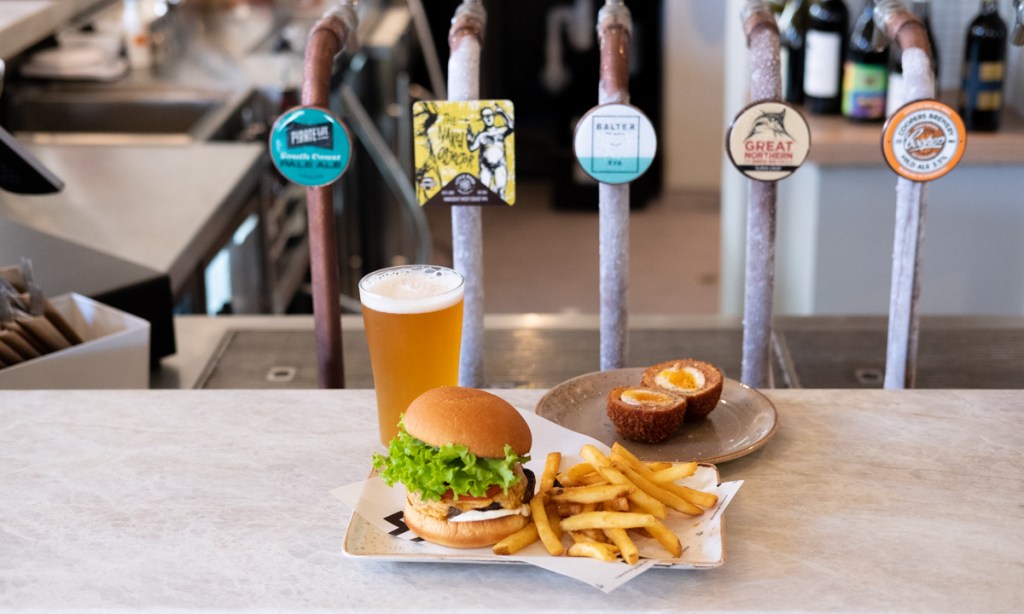
Things are more casual at the bar
From the perspective of Duxton, diversity of offering across the group has been an important consideration. While the company has removed pokies from some of its venues, Josh is quick to add that they still operate pubs with gaming “where it makes sense”. They also decide on a level of dining based on a venue’s location and surrounding market.
At Crafers and Stirling, which are affiliated with but not owned by Duxton, “they’re dining-led venues, and they’re sort of a mid-point,” Josh says, “where [The Brompton Hotel] is something that’s gone the whole way.”
The first round of clientele to come through the Brompton “were slightly surprised”, Andrew says. “It was a little bit more haute than what they thought.” But, if Josh’s hunch is correct, Adelaide is primed for more refined dining experiences, even in pubs.
“There’s no venue like this in the area,” he says.
“There are some great pubs – the Gaslight and Lady Daly and things like that – but that’s why we’re coming in at a slightly different pitch.
“I think particularly in the last two years, if you used Arkhé, the Botanic and now Andrew as a good example of three Michelin-credited chefs… [who’ve] all built a home here and opened amazing restaurants. I think it’s a good call to arms for the rest of the industry.”
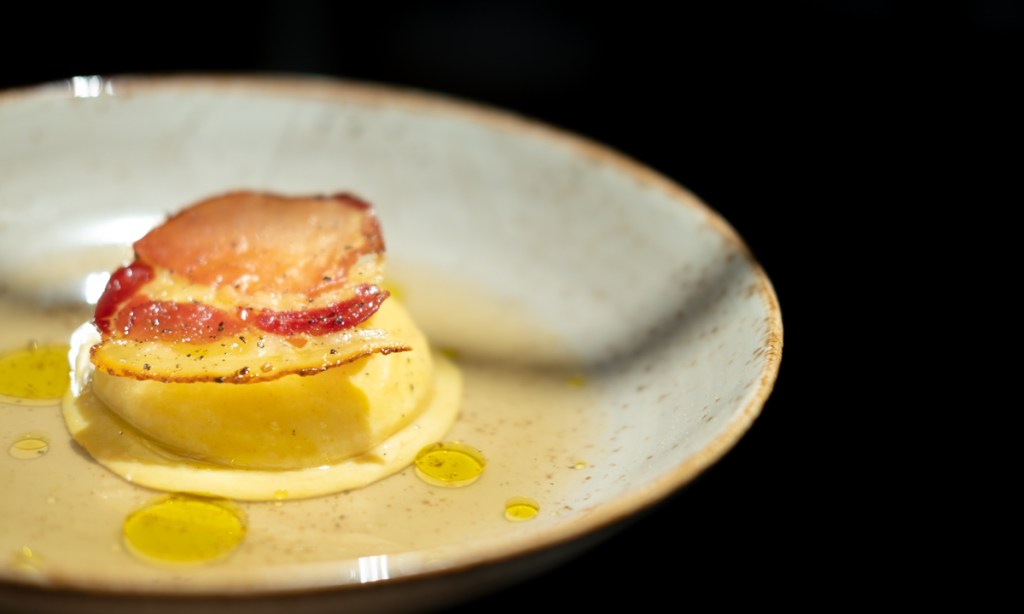
The Brompton’s smoked potato and hen egg ravioli in prosciutto broth



